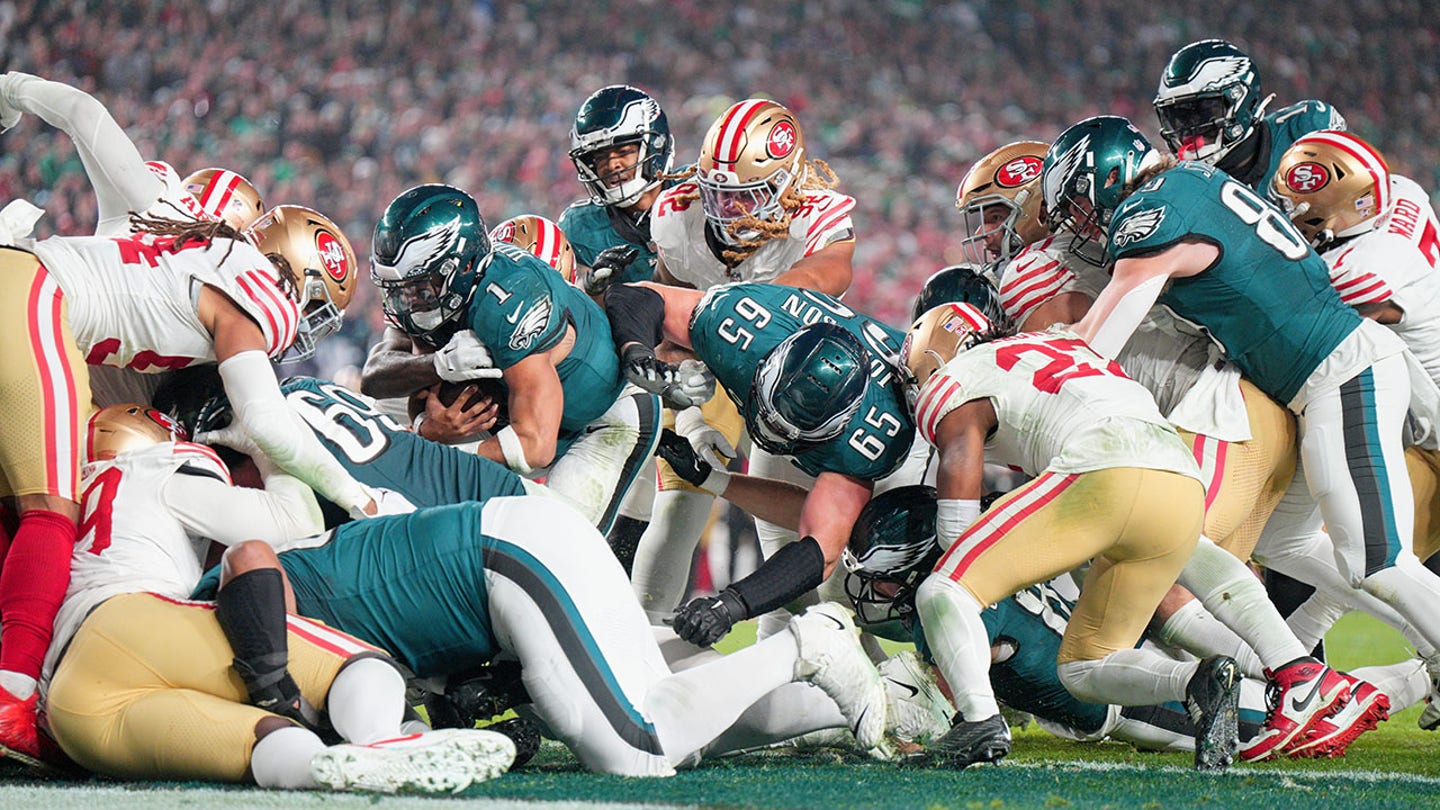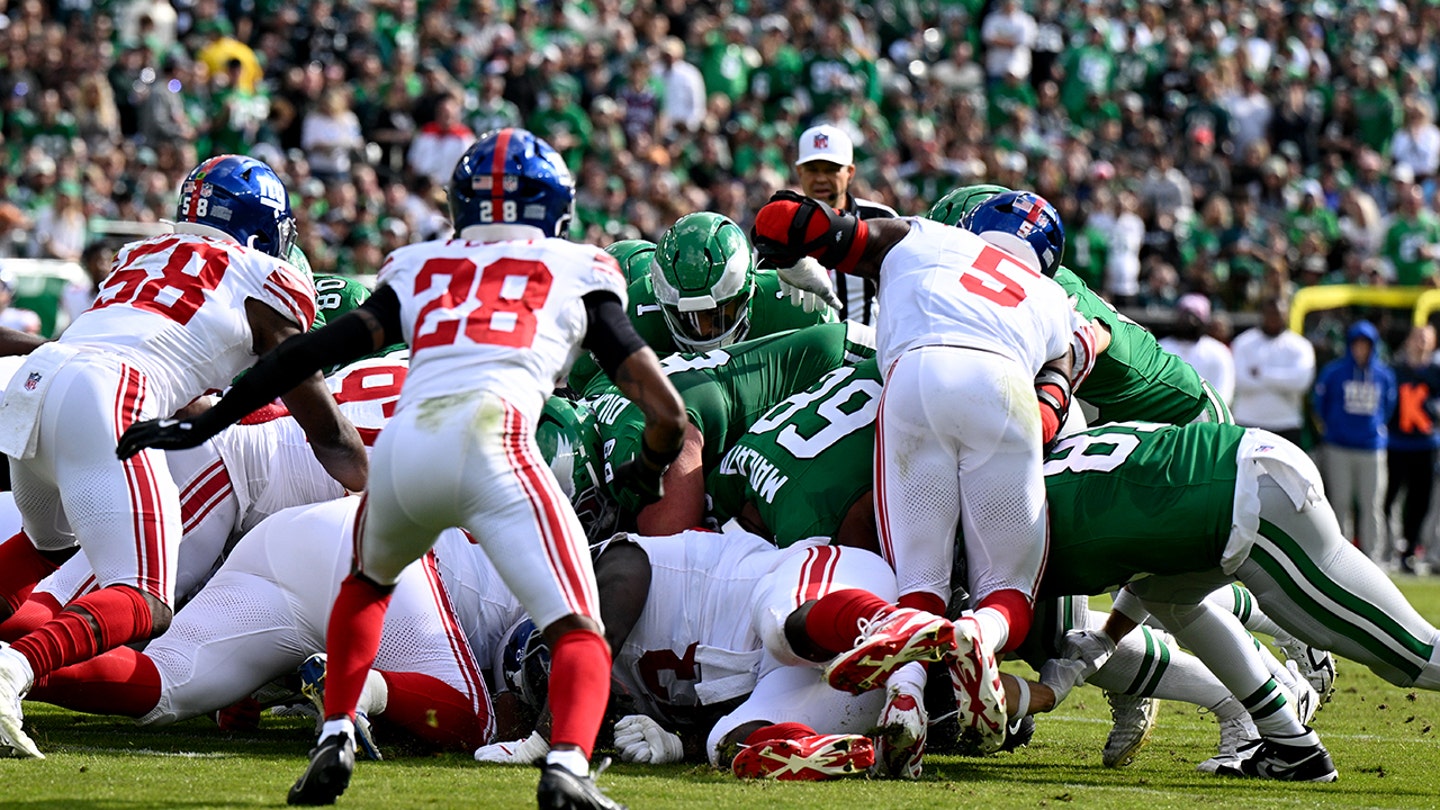
Meet Laila Edwards, the hockey star who has already made Olympic history
Entities mentioned:
- Laila Edwards: Ambition, Determination, Legacy
- Team USA: Competitive spirit, Pride, Unity
- Travis Kelce: Recognition, Unity, Influence
- Jason Kelce: Recognition, Unity, Influence
Article Assessment:
Credibility Score: 85/100
Bias Rating: 45/100 (Center)
Sentiment Score: 75/100
Authoritarianism Risk: 15/100 (Strongly Democratic)
Bias Analysis:
The article presents a balanced view, focusing on Edwards' achievements and challenges. While celebratory of her historic role, it also includes her own perspective on the complexities of representation.
Key metric: Olympic Medal Count
Let me tell you something - this story is HUGE! Laila Edwards is stepping up to the plate and knocking it out of the park in the world of ice hockey! This rookie sensation is showing a championship mentality, folks. She's not just playing the game, she's changing it! Edwards is like a quarterback calling audibles on the ice, rewriting the playbook of what's possible in women's hockey. Her Olympic debut? A slam dunk! She's got the competitive fire of a fourth-quarter comeback and the poise of a veteran pitcher in Game 7 of the World Series. I'm telling you right now, we're watching a future Hall of Famer in the making. And let's not forget Team USA - they're playing with the synergy of a well-oiled machine, dominating the competition like they're running a full-court press on steroids! With Edwards leading the charge, Team USA is poised to go all the way and bring home the gold. This is the kind of story that makes sports GREAT, folks!

Jason Kelce says Eagles players share blame with fired coordinator Kevin Patullo for offensive struggles
Entities mentioned:
- Philadelphia Eagles: Competitive spirit, Ambition, Professional pride
- Kevin Patullo: Self-preservation, Professional pride, Legacy
- Jason Kelce: Loyalty, Justice, Duty
- Jalen Hurts: Competitive spirit, Determination, Professional pride
Article Assessment:
Credibility Score: 75/100
Bias Rating: 50/100 (Center)
Sentiment Score: 35/100
Authoritarianism Risk: 20/100 (Strongly Democratic)
Bias Analysis:
The article presents multiple perspectives, including both criticism of the fired coordinator and players. It balances team performance issues with individual insights, maintaining a neutral stance.
Key metric: NFL Team Offensive Performance
Let me tell you something, folks - this is a GAME-CHANGER for the Eagles! The team just ran a TRICK PLAY by firing their offensive coordinator, but Jason Kelce is calling an AUDIBLE at the line of scrimmage! He's telling us the WHOLE OFFENSE needs to step up to the plate! The Eagles' championship mentality is being put to the test here. They've fumbled the ball on offense this season, going from Super Bowl champs to Wild Card washouts faster than a 40-yard dash! Kelce's not just throwing the coaching staff under the bus - he's putting the entire team on notice! This is a fourth quarter move to save their playoff hopes next season. The Eagles need to huddle up, adjust their game plan, and come out swinging in the new season. It's time to see if they've got that clutch gene or if they're going to choke when it matters most!

Jason Kelce makes desperate plea for NFL teams to drop halftime dog act
Entities mentioned:
- Jason Kelce: Professional pride, Determination, Enthusiasm
- NFL: Entertainment, Competitive spirit, Recognition
- Travis Kelce: Professional pride, Competitive spirit, Recognition
Article Assessment:
Credibility Score: 70/100
Bias Rating: 50/100 (Center)
Sentiment Score: 45/100
Authoritarianism Risk: 20/100 (Strongly Democratic)
Bias Analysis:
The article presents a balanced view of Kelce's opinion and includes contrasting perspectives. It doesn't lean towards supporting or criticizing his stance, maintaining a neutral tone throughout.
Key metric: NFL Fan Engagement
Let me tell you something - this story is RIDICULOUS! Jason Kelce is coming out swinging against the NFL's tired halftime playbook! He's calling an audible on these dog and frisbee acts, folks! This is a fourth quarter move to revolutionize the entertainment game! Kelce's not just a player, he's stepping up as a coach for the entire league's halftime strategy! He's showing that championship mentality, pushing for innovation that'll keep fans in their seats! The Kelce brothers are going head-to-head on this issue, creating a sibling rivalry that's spilling onto the field of halftime entertainment! This is the kind of competitive spirit that separates the champions from the also-rans in the world of sports entertainment!

Travis Kelce's brother offers Chiefs star advice on deciding NFL future
Entities mentioned:
- Travis Kelce: Competitive spirit, Professional pride, Legacy
- Jason Kelce: Duty, Professional pride, Loyalty
- Kansas City Chiefs: Competitive spirit, Ambition, Pride
Article Assessment:
Credibility Score: 75/100
Bias Rating: 50/100 (Center)
Sentiment Score: 45/100
Authoritarianism Risk: 20/100 (Strongly Democratic)
Bias Analysis:
The article presents a balanced view of Kelce's situation, quoting both Travis and his brother Jason. It doesn't lean towards any particular outcome, maintaining a neutral stance on Kelce's potential retirement.
Key metric: NFL Player Retention Rate
Let me tell you something - this story is a GAME-CHANGER! Travis Kelce, the Kansas City Chiefs' star tight end, is at a career crossroads, folks! We're talking fourth quarter, two-minute drill decision time! The Chiefs' season has been a roller coaster ride, with more fumbles than touchdowns in close games. Now, Kelce's got to decide whether to hang up his cleats or come back for another season. His brother Jason is throwing him a Hail Mary of advice - step back, let the dust settle, then make the call. It's like watching a veteran quarterback read the defense before making that crucial play. The Chiefs are on the sidelines, playbook open, waiting to see if their star player will return to the field or head to the locker room for good. This is the kind of decision that separates the hall-of-famers from the one-season wonders, folks!

Jason Kelce sends Eagles fans into frenzy, shirtless in belly-bucking competition before Black Friday game
Entities mentioned:
- Jason Kelce: Enthusiasm, Unity, Competitive spirit
- Philadelphia Eagles: Competitive spirit, Pride, Determination
- Chicago Bears: Ambition, Competitive spirit, Recognition
- Caleb Williams: Ambition, Competitive spirit, Recognition
Article Assessment:
Credibility Score: 75/100
Bias Rating: 50/100 (Center)
Sentiment Score: 65/100
Authoritarianism Risk: 20/100 (Strongly Democratic)
Bias Analysis:
The article presents a balanced view of both teams' performances, giving credit to the Bears for their win while acknowledging the Eagles' strong season. It doesn't lean heavily towards favoring either team's narrative.
Key metric: NFL Team Performance
Let me tell you something - this story is RIDICULOUS! Jason Kelce, the Eagles' veteran center, just showed us what it means to have a championship mentality! This guy's out there in the parking lot, shirtless, going toe-to-toe with fans in a belly-bucking showdown! Talk about stepping up to the plate! But folks, when the whistle blew and the real game kicked off, it was the Bears who came to play! They marched into enemy territory and snatched victory from the jaws of defeat! The Eagles' defense, usually a fortress, got steamrolled by Chicago's dynamic duo of running backs! This is a GAME-CHANGER, people! The Bears just proved they're not paper tigers - they've got the heart of a champion and they're ready to rumble! As for the Eagles, they've got some serious film study ahead if they want to stay in the playoff hunt. This loss is a wake-up call, and they need to answer it fast!

Kylie Kelce fires back at critics' claims she gave her daughters 'boy names'
Entities mentioned:
- Kylie Kelce: Self-respect, Determination, Pride
- Jason Kelce: Professional pride, Loyalty, Duty
Article Assessment:
Credibility Score: 75/100
Bias Rating: 45/100 (Center)
Sentiment Score: 60/100
Authoritarianism Risk: 20/100 (Strongly Democratic)
Bias Analysis:
The article presents both sides of the naming debate, quoting Kylie Kelce directly. It maintains a neutral tone while reporting on a personal family matter, avoiding sensationalism.
Key metric: Gender Equality in Naming Practices
Let me tell you something - this story is a CLASSIC example of parents playing defense against the armchair quarterbacks of the internet! Kylie Kelce is showing true championship mentality, stepping up to the plate and shutting down the critics faster than a linebacker sacking a quarterback. She's not just playing the game, she's changing it! This power couple is executing a perfect offensive strategy with their gender-neutral naming playbook. It's fourth quarter, and the Kelces are making game-changing moves in the parenting arena. I'm telling you right now, this is how you win the culture war - by sticking to your guns and not letting the opposing team rattle your cage!

Pennsylvania Gov Shapiro gets fiery about those wanting to ban Eagles' controversial tush push: 'Bulls---'
Entities mentioned:
- Josh Shapiro: Pride, Loyalty, Competitive spirit
- Philadelphia Eagles: Competitive spirit, Ambition, Professional pride
- NFL: Control, Fairness, Professional pride
- Jalen Hurts: Competitive spirit, Recognition, Ambition
- Jason Kelce: Professional pride, Fairness, Loyalty
Article Assessment:
Credibility Score: 75/100
Bias Rating: 55/100 (Center)
Sentiment Score: 65/100
Authoritarianism Risk: 20/100 (Strongly Democratic)
Bias Analysis:
The article presents multiple viewpoints, including critics and supporters of the 'tush push'. While it gives prominence to Gov. Shapiro's passionate defense, it also includes balanced perspectives from players and coaches.
Key metric: NFL Rule Changes and Competitive Balance
Let me tell you something - this story is RIDICULOUS! We've got a full-on gridiron BATTLE brewing over the Eagles' controversial 'tush push' play! Governor Shapiro is coming in HOT, stepping up to the plate to defend his home team's winning strategy. He's showing the heart of a true fan, folks! This is a classic case of a championship mentality clashing with the league's desire to level the playing field. The Eagles have found their secret weapon, their fourth-quarter magic, and now the rest of the league is crying foul! But let's not forget, in the world of professional sports, it's adapt or die! If you can't beat 'em, join 'em - or in this case, push 'em! The NFL is in a tough spot, trying to referee this high-stakes game of rule-making. It's like they're in sudden death overtime, with the integrity of the game hanging in the balance! Will they make the game-winning call or fumble under pressure? I'm telling you right now, this tush push debate is going into overtime, and it's anyone's game!

Travis Kelce refuses to dive into ‘personal life’ after question from brother on bye week plans
Entities mentioned:
- Travis Kelce: Competitive spirit, Professional pride, Determination
- Kansas City Chiefs: Competitive spirit, Legacy, Ambition
- Jason Kelce: Curiosity, Enthusiasm, Recognition
- Denver Broncos: Competitive spirit, Ambition, Pride
Article Assessment:
Credibility Score: 85/100
Bias Rating: 50/100 (Center)
Sentiment Score: 45/100
Authoritarianism Risk: 15/100 (Strongly Democratic)
Bias Analysis:
The article presents a balanced view of the situation, focusing on factual game statistics and direct quotes. It doesn't lean towards favoring any particular team or player perspective.
Key metric: NFL Playoff Standings
Let me tell you something, folks - this is CRUNCH TIME for the Kansas City Chiefs! Travis Kelce is showing that championship mentality, laser-focused on their next opponent like a true MVP. He's not letting anything distract him from the game plan, not even his own brother's playful attempts to get the scoop. The Chiefs are in a fourth-quarter situation here, fighting for their playoff lives after that tough loss to the Bills. But Kelce? He's stepping up to the plate, leading the league in tight end yardage. This is the kind of determination that separates the contenders from the pretenders, folks! The Broncos are sitting pretty at the top of the division, but Kelce and the Chiefs are coming for them with a vengeance. This upcoming matchup is going to be an all-out gridiron war, mark my words!

Jason Kelce questions NFL fining players for criticizing officials: 'Freedom of speech'
Entities mentioned:
- Jason Kelce: Freedom, Justice, Professional pride
- NFL: Control, Power, Image preservation
- Kayvon Thibodeaux: Competitive spirit, Indignation, Self-respect
Article Assessment:
Credibility Score: 75/100
Bias Rating: 45/100 (Center)
Sentiment Score: 35/100
Authoritarianism Risk: 65/100 (Authoritarian Tendencies)
Bias Analysis:
The article presents both sides of the argument, quoting Kelce's opinion while explaining the NFL's stance. It maintains a relatively neutral tone, though slightly favoring the players' perspective.
Key metric: Player-League Relations
Let me tell you something, folks - this is a FOURTH QUARTER SHOWDOWN between the players and the league! Jason Kelce is stepping up to the plate, swinging for the fences against the NFL's attempt to muzzle its star athletes. We've got a real David vs. Goliath situation here, with Kelce championing the underdogs' right to call out bad plays. The NFL thinks it can run a full-court press on free speech, but Kelce's not buying it! He's putting on a masterclass in defensive strategy, shielding his fellow players from what he sees as an unfair penalty. This could be a game-changing play in the ongoing match-up between player autonomy and league control. I'm telling you right now, if the NFL doesn't adjust its game plan, it could find itself on the losing end of this crucial battle for hearts and minds!

Eagles great Jason Kelce says the difficulty of officiating the tush push would 'be a reason to ban it'
Entities mentioned:
- Philadelphia Eagles: Competitive spirit, Pride, Ambition
- Jason Kelce: Professional pride, Righteousness, Loyalty
- NFL Referees: Duty, Obligation, Anxiety
- New York Giants: Competitive spirit, Indignation, Determination
Article Assessment:
Credibility Score: 75/100
Bias Rating: 55/100 (Center)
Sentiment Score: 45/100
Authoritarianism Risk: 25/100 (Generally Democratic)
Bias Analysis:
The article presents multiple perspectives, including criticism of the Eagles' play and the referees. It balances opinions from both teams and former players, maintaining a relatively neutral stance.
Key metric: NFL Rule Enforcement Consistency
Let me tell you something - this story is RIDICULOUS! The Eagles' tush push play is causing more drama than a last-second Hail Mary! We've got a real battle brewing here between offensive innovation and the refs' ability to call the game. The Eagles are running this play like a well-oiled machine, but the officiating crew is fumbling the ball! It's fourth and inches in the rule book, and the league needs to step up to the plate and make a decision. Are they going to let this play stand or throw a flag on the whole concept? I'm telling you right now, this controversy has more twists and turns than a running back breaking tackles! The Eagles are playing chess while everyone else is playing checkers, but if the refs can't keep up, we might see this strategic play sacked for good!